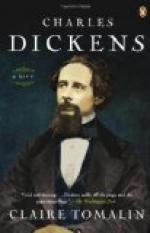FOOTNOTES:
[13] I think critics, and perhaps I myself, have been a little hard on this Quarterly Reviewer. He did not, after all, say that Dickens would come down like a stick, only that he might do so if he wrote too fast and furiously.
CHAPTER V.
“Pickwick” had been a novel without any plot. The story, if story it can be called, bore every trace of its hasty origin. Scene succeeded scene, and incident incident, and Mr. Pickwick and his three friends were hurried about from place to place, and through adventures of all kinds, without any particularly defined purpose. In truth, many people, and myself among the number, find some difficulty in reading the book as a connected narrative, and prefer to take it piecemeal. But in “Oliver Twist” there is a serious effort to work out a coherent plot, and real unity of conception. Whether that conception be based on probability, is another point. Oliver is the illegitimate son of a young lady who has lapsed from virtue under circumstances of great temptation, but still lapsed from virtue, and who dies in giving him birth. He is brought up as a pauper child in a particularly ill-managed workhouse, and apprenticed to a low undertaker. Thence he escapes, and walks to London, where he falls in with a gang of thieves. His legitimate brother, an unutterable scoundrel, happens to see him in London, and recognizing him by a likeness to their common father, bribes the thieves to recapture him when he has escaped from their clutches. Now I would




